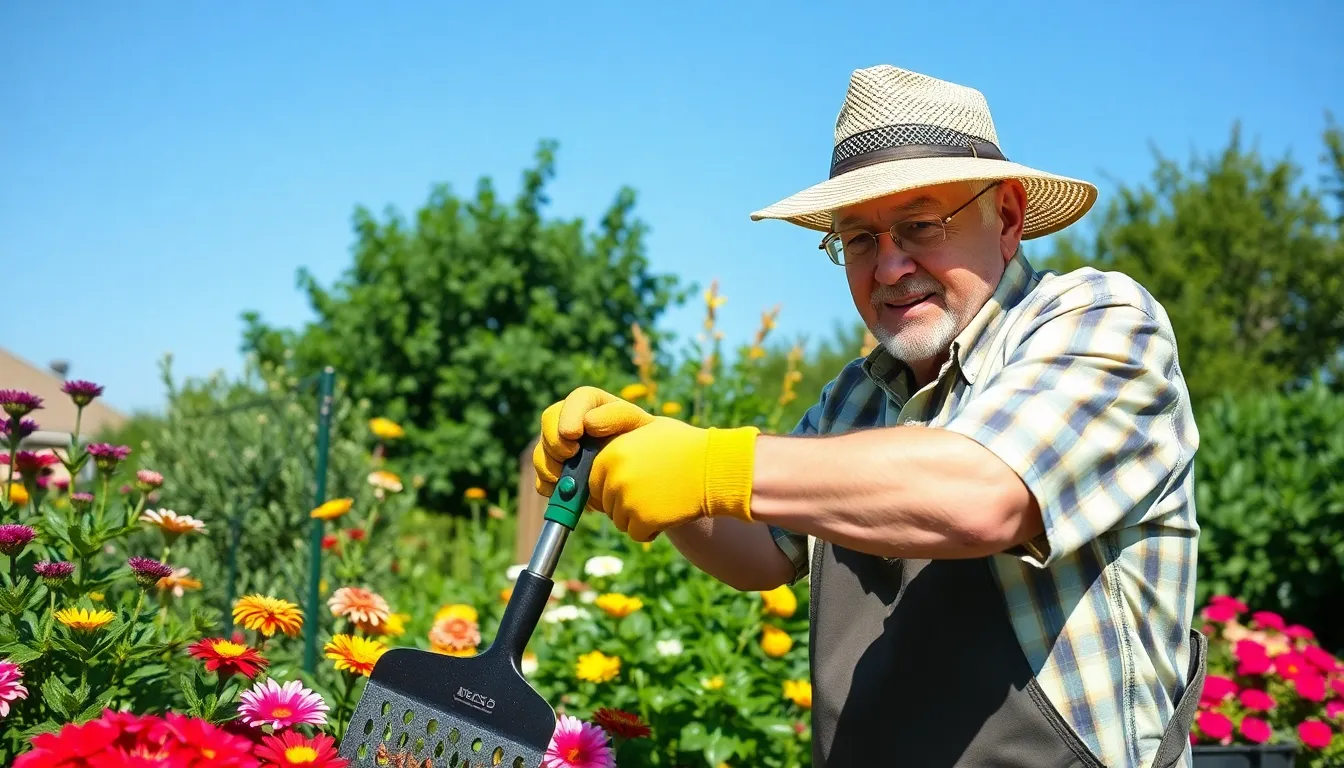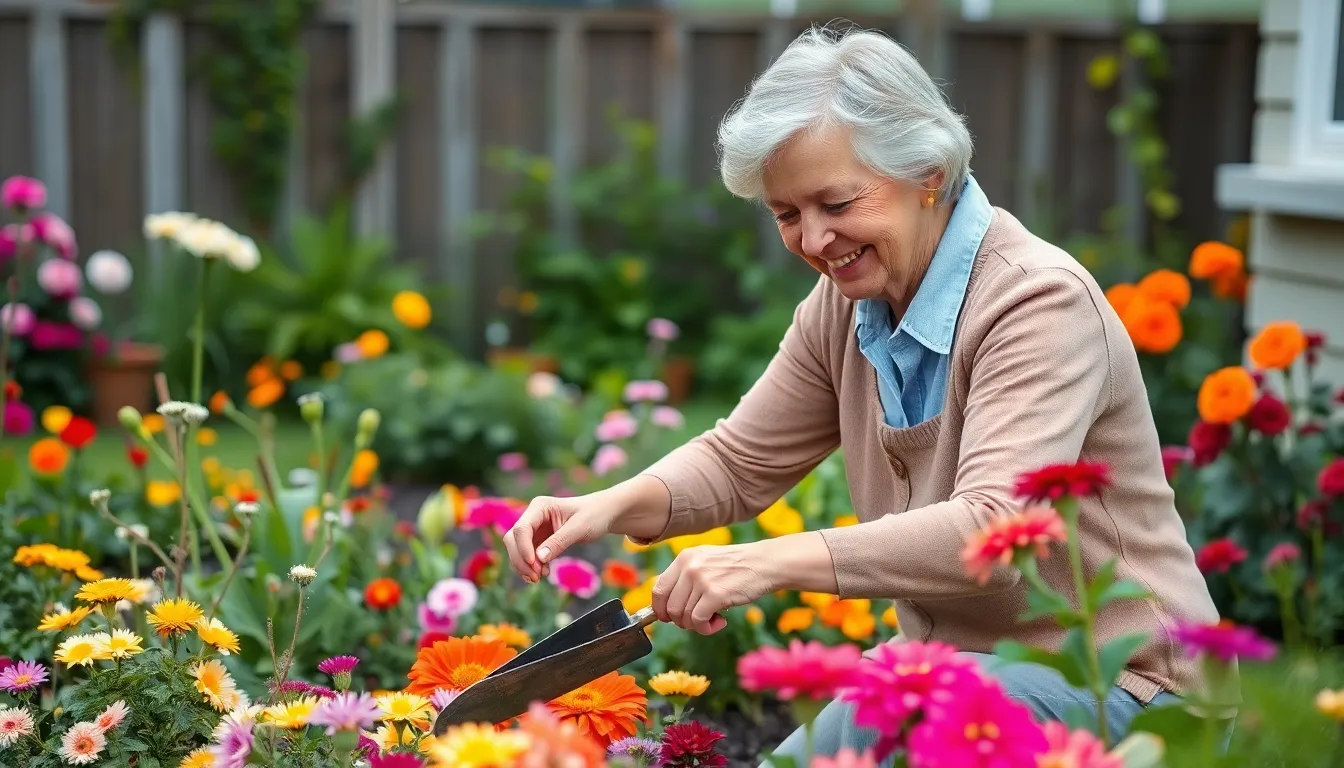Gardening can be a rewarding hobby, but for the elderly, it often comes with its own set of challenges. It’s not just about planting flowers and pulling weeds; it’s about finding the right tools that make the job easier and more enjoyable. Imagine wielding a shovel that feels like a feather or using pruners that practically do the work for you. It’s time to turn that garden into a paradise without breaking a sweat—or a hip!
Gardening Tools For Elderly
Gardening tools play a crucial role in enhancing the gardening experience for elderly individuals. Lightweight tools significantly reduce strain on their bodies, making tasks easier to handle. Using ergonomically designed tools decreases the risk of injury and fatigue, allowing seniors to enjoy gardening for more extended periods.
Specialized equipment, such as raised garden beds and long-handled tools, promotes a comfortable working posture. Elevated beds limit bending and kneeling, which often cause discomfort. Additionally, tools with padded grips provide increased comfort during use, making gardening more enjoyable.
Selecting the right tools improves overall safety in the garden. Non-slip handles help prevent accidents, while tools with safety features tend to minimize injury risks. The availability of garden carts can assist in transporting supplies efficiently, further reducing physical strain.
Accessibility considerations also enhance gardening for those with mobility challenges. Tools that accommodate limited hand strength or dexterity encourage seniors to participate actively. Innovative gadgets like self-watering planters simplify maintenance tasks, encouraging continued engagement with gardening.
Incorporating these tailored tools not only supports physical well-being but also nurtures mental health. Seniors who garden frequently report increased feelings of happiness and satisfaction. Emphasizing the restorative qualities of gardening furthers the argument for investing in appropriate tools.
Investing in high-quality gardening tools enhances both the enjoyment and ability to maintain gardens effectively. Thus, the right equipment promotes a fulfilling and therapeutic gardening experience for elderly individuals.
Essential Gardening Tools For Elderly

The right gardening tools can vastly improve the gardening experience for elderly individuals. High-quality, specialized tools ensure that every gardening session remains enjoyable and manageable.
Lightweight Tools
Lightweight tools significantly reduce the risk of strain. Tools like forged aluminum trowels, pruners, and rakes provide effective functionality without added weight. They enable seniors to work for longer periods without fatigue. Choosing tools weighing under three pounds enhances comfort during use. Opting for plastic tools rather than metal ones offers a budget-friendly lightweight solution.
Ergonomic Designs
Ergonomic designs promote natural hand positions while gardening. Tools designed with soft grips and bent handles minimize wrist stress. A shovel with a D-grip design facilitates easier digging and lifting from various angles. Long-handled tools prevent excessive bending, which alleviates back pressure. Gardeners can comfortably tend to their plants without pain thanks to these thoughtful designs. Adopting ergonomic tools encourages consistent gardening practices while protecting physical well-being.
Recommended Gardening Tools
Choosing the right gardening tools enhances the gardening experience for the elderly. These tools prioritize comfort, safety, and ease of use.
Gardening Gloves
Gardening gloves designed for seniors provide essential hand protection and comfort. Lightweight materials, like cotton or latex, keep hands dry and allow for flexibility. Gloves with reinforced fingertips resist wear and tear, extending their lifespan. Features like adjustable wrist straps ensure a snug fit and prevent dirt from entering. Opting for gloves with extra padding alleviates pressure on hands, making extended gardening sessions more enjoyable. Many gloves come in various sizes, allowing individuals to find the perfect fit for their hands. Investing in quality gloves significantly boosts gardening efficiency and promotes a pleasurable experience.
Raised Garden Beds
Raised garden beds allow for easier access and improved ergonomics while gardening. Constructed at a convenient height, these beds minimize bending and stretching, reducing strain on the back. Various materials, such as wood or metal, provide durability and aesthetic appeal. Height options range from 24 to 36 inches, accommodating different needs and preferences. Easy accessibility encourages seniors to engage more actively in gardening. Soil quality and drainage improve with raised beds, leading to healthier plants. Additionally, these beds can be built to include wheels, facilitating mobility and enhancing the overall gardening experience.
Tips For Selecting The Right Tools
Choosing the right gardening tools makes a significant difference for elderly individuals. Tools tailored to specific needs enhance comfort and safety while gardening.
Assessing Individual Needs
Evaluating individual physical abilities is crucial. Some may require lightweight tools, while others might benefit from long-handled versions to minimize bending. Consider personal preferences, such as grip size and tool weight, when selecting equipment. Many seniors appreciate tools designed for ease of use, including those with ergonomic features. Understanding specific gardening tasks can influence choices, like whether pruning or digging is a primary focus. Making decisions based on needs ensures a more enjoyable gardening experience.
Considering Safety Features
Addressing safety can minimize the risk of accidents in the garden. Non-slip handles provide a secure grip, particularly in wet conditions. Tools with bright colors can increase visibility, lowering the chance of misplacement. Lightweight equipment helps prevent overexertion, reducing injury risk during prolonged use. Garden carts ease transportation of tools and supplies, lessening the strain on seniors. Choosing tools with safety features creates a supportive environment, allowing seniors to focus on their gardening enjoyment rather than potential hazards.
Conclusion
Choosing the right gardening tools is essential for elderly individuals looking to enjoy their gardening experience. Lightweight and ergonomically designed tools can significantly reduce physical strain while promoting safety and accessibility. By investing in high-quality equipment tailored to their needs, seniors can cultivate their gardens with ease and comfort. This not only enhances their physical well-being but also contributes positively to their mental health. With the right tools in hand, gardening can remain a fulfilling and therapeutic activity for years to come.

